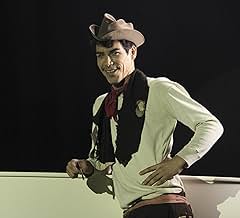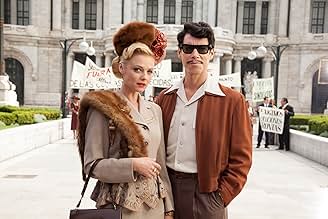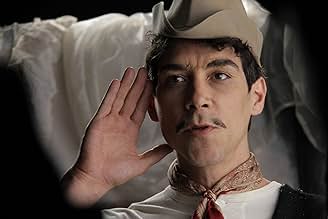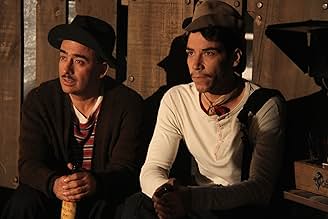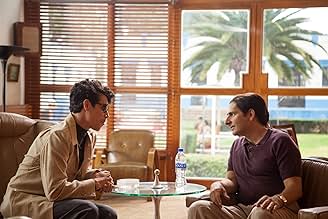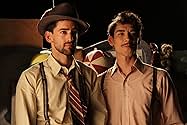IMDb RATING
6.6/10
4.3K
YOUR RATING
The untold story of Mexico's greatest and most beloved comedy film star of all time, from his humble origins on the small stage to the bright lights of Hollywood.The untold story of Mexico's greatest and most beloved comedy film star of all time, from his humble origins on the small stage to the bright lights of Hollywood.The untold story of Mexico's greatest and most beloved comedy film star of all time, from his humble origins on the small stage to the bright lights of Hollywood.
- Director
- Writers
- Stars
- Awards
- 30 wins & 11 nominations total
Arantza Muñoz
- Bailarina
- (as Aranzta Muñoz)
Armando Vega Gil
- Músico Salón
- (as Armando Vega-Gil)
- Director
- Writers
- All cast & crew
- Production, box office & more at IMDbPro
Featured reviews
I've seen the movie "Cantinflas" directed by Sebastian del Amo, and I am convinced that this is "the film that every Mexican must-see". This is biopic is the story of Mexico's greatest and most beloved comedy film star of all time, Mario Moreno "Cantinflas". The film follows him from his humble beginnings on the small stage to the bright lights of Hollywood.
On one side you discover the man: Mario Moreno who expressed his values through his Cantinflas character on films and stage. Cantinflas gives voice to social issues: on his films he would protest against injustice, keeping his cool being sincere, generous, honest and optimistic. Cantinflas never resorted to vulgarity, nor to profanity, insults or violence to make us laugh, and his unique speech style (cantinflear) reflects the demagogic rhetoric we hear from politicians. We all recognize on Mario Moreno "Cantinflas" a Mexican hero who overcame poverty and lack of formal education to become an artist and humanist, recognized worldwide.
On the other hand, there is the film where actor Oscar Jaenada does a masterful "incarnation" of Mario Moreno Cantinflas. Thanks to Oscar's credibility and this film's quality production, more people attended movie theaters to watch the movie and a new generations will better understand Cantinflas legacy and values.
In addition, the performances of other actors like Ilse Salas, Barbara Mori, Gabriela de la Garza and Luis Gerardo Méndez, to name a few, were preceded by months of preparation and are really a tribute to the characters they play. Original music by Aleks Syntek. Screen play by Edui Tijerina, and excellent production of entrepreneurs Vidal Garza Cantú, Adolfo Franco, Alejandro Barron, and Mario Moreno Ivanova. Thus, "Cantinflas" brings to life Mexico's hero, so this is a most- see film for everyone in Mexico, and elsewhere.
On one side you discover the man: Mario Moreno who expressed his values through his Cantinflas character on films and stage. Cantinflas gives voice to social issues: on his films he would protest against injustice, keeping his cool being sincere, generous, honest and optimistic. Cantinflas never resorted to vulgarity, nor to profanity, insults or violence to make us laugh, and his unique speech style (cantinflear) reflects the demagogic rhetoric we hear from politicians. We all recognize on Mario Moreno "Cantinflas" a Mexican hero who overcame poverty and lack of formal education to become an artist and humanist, recognized worldwide.
On the other hand, there is the film where actor Oscar Jaenada does a masterful "incarnation" of Mario Moreno Cantinflas. Thanks to Oscar's credibility and this film's quality production, more people attended movie theaters to watch the movie and a new generations will better understand Cantinflas legacy and values.
In addition, the performances of other actors like Ilse Salas, Barbara Mori, Gabriela de la Garza and Luis Gerardo Méndez, to name a few, were preceded by months of preparation and are really a tribute to the characters they play. Original music by Aleks Syntek. Screen play by Edui Tijerina, and excellent production of entrepreneurs Vidal Garza Cantú, Adolfo Franco, Alejandro Barron, and Mario Moreno Ivanova. Thus, "Cantinflas" brings to life Mexico's hero, so this is a most- see film for everyone in Mexico, and elsewhere.
I attended this movie without knowing anything about Cantinflas. I am pleased to report that this movie is informing and entertaining. The time zone depicted is about 1935-1956 in Mexico.
The production quality is first rate. However, understand that the lighting and camera angles approximate what was being used in the 1940s and 50s. Therefore, this film has a simple look, an historical feel about it. I particularly enjoyed the costumes and fashions of the actresses during the 40s and 50s.
I strongly suggest that you read "Wiki" descriptions of his career before you see the movie. This will cause you to understand the importance of this man to Mexico and to the U.S. In fact, when he died, Mexico had 3 days of mourning; and the U.S. Senate had a moment of silence to honor this actor.
Cantinflas was a Mexican comedian at approximately the level of a Charlie Chaplin or Bob Hope. He started from humble street origins in Mexico and slowly worked his way to Hollywood. He eventually starred in "80 Days Around the World" which featured top stars and won several Oscars.
His name is an invention that may roughly translate in Spanish to, "He who drinks too much in the Cantina".
This film has both English and Spanish subtitles which alternate at appropriate times.
Cantiflas's act might be called "family entertainment" worthy of reaching wide audiences. There is no outrageous violence, no sex, no drug usage, no monsters, no superheros, no flaming car crashes. The story is a predictable rags to riches story which makes for quality and gentle Sunday afternoon entertainment. Religious people should not be offended. This story reinforces the belief that hard focused work may be rewarded with fame and happiness.
This film is more about the events and people which brought Mario Moreno (Cantinflas) to success on stage and film. His performances are not detailed, not lengthy, only suggestions of his talent. If his performances were recreated, I think this movie would gain a higher rating. You will see Marlon Brando, Elizabeth Taylor, Yule Brenner, Charlie Chaplin and others played out in this film as well.
When you read the "Wiki" description, you will understand that he created a kind of humor which allowed him to use a free form style, he was an ad lib artist. Perhaps he could be compared to the late Robin Williams. From what I heard during the show he had a light touch to his truth telling on stage.
Cantinflas is always a respectable story; and you should not be embarrassed to bring any friend to see this film with you. I am not of Mexican heritage. About 95% of those in the audience seemed to be Mexican. So, you now know that you could be broadening your education of film history to see this film. And again, I think that if you grew up seeing his films, you will enjoy this movie more and give it a higher rating here on IMDb. If not, then for you we have a predictable, simple story which may earn a 6.5 or 7.0 on IMDb.
I particularly enjoyed seeing Mexico, the buildings, the fashions, the restaurants at their very polished best. The music is romantic. I felt that if I had seen his film when I was young, this film would have provided me with the "nostalgia effect". Nonetheless, it was a nice visit to Mexico during the 1940s.
The direction of the film was conservative and never confused. There were no "tricks" of the director to distract me from the simple, linear story.
And there is the greatest value of this film: nostalgia. Older folks who witnessed his acts will gain the most benefit from this reenactment of his past. Those older people will no doubt relive their youth as they enjoy seeing Mario Moreno go through his trials to finally appear in theater and film to become a national hero.
There are very few dark moments. And no foul language that I could detect.
Cantinflas was a master comedian. However, I do not think this movie could truly reproduce the comedic timing that Cantinflas used. Therefore, Cantinflas's wit is not displayed in this movie in a manner that I could laugh at most of the time. Subtitles slow down the delivery of his jokes. The effect of surprise in his jokes is muted by the English translation and the use of subtitles. So, as a film goer I am at a disadvantage. His jokes were gentle surprise one liners that entertained families on stage in the Cantinas of Mexico and film. But I am hardly an expert on his career. All I have seen is this movie.
I think that if you wanted to treat a person to a gentle story, with only a few moments of aggressive drama, you would be safe to bring any friend to see this film. This is a "nice film." And if that friend were born around 1940, all the better. And now I want to know more about Mario Moreno's career. And I would like to experience the results of his comedic timing from the master. Charlie Chaplin is said to have considered him the most humorous man in theater. That is quite a compliment.
Mario Moreno upset the Union of Actors in Mexico. He shunned the studio system of Hollywood, too. Yet he rose from the very bottom of Mexican society to become an Oscar winning actor.
This film is safe, gentle entertainment. I feel I broadened my understanding of film history after seeing this movie. I recommend you see it too. I am sure you will leave the theater with a warm, gentle feeling.
The production quality is first rate. However, understand that the lighting and camera angles approximate what was being used in the 1940s and 50s. Therefore, this film has a simple look, an historical feel about it. I particularly enjoyed the costumes and fashions of the actresses during the 40s and 50s.
I strongly suggest that you read "Wiki" descriptions of his career before you see the movie. This will cause you to understand the importance of this man to Mexico and to the U.S. In fact, when he died, Mexico had 3 days of mourning; and the U.S. Senate had a moment of silence to honor this actor.
Cantinflas was a Mexican comedian at approximately the level of a Charlie Chaplin or Bob Hope. He started from humble street origins in Mexico and slowly worked his way to Hollywood. He eventually starred in "80 Days Around the World" which featured top stars and won several Oscars.
His name is an invention that may roughly translate in Spanish to, "He who drinks too much in the Cantina".
This film has both English and Spanish subtitles which alternate at appropriate times.
Cantiflas's act might be called "family entertainment" worthy of reaching wide audiences. There is no outrageous violence, no sex, no drug usage, no monsters, no superheros, no flaming car crashes. The story is a predictable rags to riches story which makes for quality and gentle Sunday afternoon entertainment. Religious people should not be offended. This story reinforces the belief that hard focused work may be rewarded with fame and happiness.
This film is more about the events and people which brought Mario Moreno (Cantinflas) to success on stage and film. His performances are not detailed, not lengthy, only suggestions of his talent. If his performances were recreated, I think this movie would gain a higher rating. You will see Marlon Brando, Elizabeth Taylor, Yule Brenner, Charlie Chaplin and others played out in this film as well.
When you read the "Wiki" description, you will understand that he created a kind of humor which allowed him to use a free form style, he was an ad lib artist. Perhaps he could be compared to the late Robin Williams. From what I heard during the show he had a light touch to his truth telling on stage.
Cantinflas is always a respectable story; and you should not be embarrassed to bring any friend to see this film with you. I am not of Mexican heritage. About 95% of those in the audience seemed to be Mexican. So, you now know that you could be broadening your education of film history to see this film. And again, I think that if you grew up seeing his films, you will enjoy this movie more and give it a higher rating here on IMDb. If not, then for you we have a predictable, simple story which may earn a 6.5 or 7.0 on IMDb.
I particularly enjoyed seeing Mexico, the buildings, the fashions, the restaurants at their very polished best. The music is romantic. I felt that if I had seen his film when I was young, this film would have provided me with the "nostalgia effect". Nonetheless, it was a nice visit to Mexico during the 1940s.
The direction of the film was conservative and never confused. There were no "tricks" of the director to distract me from the simple, linear story.
And there is the greatest value of this film: nostalgia. Older folks who witnessed his acts will gain the most benefit from this reenactment of his past. Those older people will no doubt relive their youth as they enjoy seeing Mario Moreno go through his trials to finally appear in theater and film to become a national hero.
There are very few dark moments. And no foul language that I could detect.
Cantinflas was a master comedian. However, I do not think this movie could truly reproduce the comedic timing that Cantinflas used. Therefore, Cantinflas's wit is not displayed in this movie in a manner that I could laugh at most of the time. Subtitles slow down the delivery of his jokes. The effect of surprise in his jokes is muted by the English translation and the use of subtitles. So, as a film goer I am at a disadvantage. His jokes were gentle surprise one liners that entertained families on stage in the Cantinas of Mexico and film. But I am hardly an expert on his career. All I have seen is this movie.
I think that if you wanted to treat a person to a gentle story, with only a few moments of aggressive drama, you would be safe to bring any friend to see this film. This is a "nice film." And if that friend were born around 1940, all the better. And now I want to know more about Mario Moreno's career. And I would like to experience the results of his comedic timing from the master. Charlie Chaplin is said to have considered him the most humorous man in theater. That is quite a compliment.
Mario Moreno upset the Union of Actors in Mexico. He shunned the studio system of Hollywood, too. Yet he rose from the very bottom of Mexican society to become an Oscar winning actor.
This film is safe, gentle entertainment. I feel I broadened my understanding of film history after seeing this movie. I recommend you see it too. I am sure you will leave the theater with a warm, gentle feeling.
As much as I love learning about the history of Hollywood, there can be something pretentious about the Hollywood biopic. The story of a great creative mind taking Hollywood by storm is one that's been told too many times and easily falls into repetition. Aside from that, there's always the sneaking suspicion that the screenwriter or director is co-opting his subject's story to wrestle with his own greatness.
"Catinflas" intrigued me enough at the start that I decided to throw caution to the wind hoping the plot wouldn't veer into cliché. I enjoyed seeing the trial and error process over how Catinflas discovered his true calling, I thought the setting was unique (especially the unforgiving Mexican stage where heckling is the norm) and the actor who played Catinflas had a magnetic working-man kind of presence.
The decision to intercut the story of Mario "Catinflas" Morelli's ascension to fame over the years and the trials and tribulation "Around the World in 80 Days" producer Michael Todd to get his film made, also had potential except for the fact Michael Todd seemed like a rather flat character (not to take anything away from Imperioli's performance), and while I enjoyed "Around the World in 80 Days" as a kid, I'm not sure if there's anything to celebrate in Todd's methodology of putting every actor he could find in the film.
The storyline itself is one I've seen a hundred times before, so the film was largely on the shoulders of Oscar Jaenada and to the degree he could, Jaenada did an extraordinary job. If only he had slightly better material to work with.
"Catinflas" intrigued me enough at the start that I decided to throw caution to the wind hoping the plot wouldn't veer into cliché. I enjoyed seeing the trial and error process over how Catinflas discovered his true calling, I thought the setting was unique (especially the unforgiving Mexican stage where heckling is the norm) and the actor who played Catinflas had a magnetic working-man kind of presence.
The decision to intercut the story of Mario "Catinflas" Morelli's ascension to fame over the years and the trials and tribulation "Around the World in 80 Days" producer Michael Todd to get his film made, also had potential except for the fact Michael Todd seemed like a rather flat character (not to take anything away from Imperioli's performance), and while I enjoyed "Around the World in 80 Days" as a kid, I'm not sure if there's anything to celebrate in Todd's methodology of putting every actor he could find in the film.
The storyline itself is one I've seen a hundred times before, so the film was largely on the shoulders of Oscar Jaenada and to the degree he could, Jaenada did an extraordinary job. If only he had slightly better material to work with.
This is a Mexican/Spanish co-production dealing with the untold story of Mexico's greatest and most beloved comedy film star of all time, Cantinflas (Oscar Jaenada) , from his poor origins on the small stage and his acting in Mexican cinema to the bright lights of Hollywood , being hired by a powerful US producer , Mike Todd (Michael Imperioli) .In his youth, he earned money as a prizefighter and worked as an acrobat in circus tent shows. As he acted in cabarets , theatres and varietee shows . He was married to Valentina Ivanova (Ilse Salas) from 1936 until her death. He appeared in more than 55 films, including as Passepartoute in his biggest hit : Around the world in 80 days (1956) . At the peak of his career in the late 1950s, Cantinflas was earning more than $1.5 million a year and was referred to in press releases as the world's highest-paid comedian. He once described as "the world's greatest comedian" by none other than Charles Chaplin (Sedgwick) .Despite the fact that Cantinflas died a millionaire several times over, and was one of the biggest stars ever in Spanish language films, he never forgot where he came from. Much of his money was given over to charitable work, including high-quality, low-income housing for Mexico City's poor. When he died, he was hailed as a national hero, and a protracted period of official mourning followed.
The picture describes various episodes about Cantinflas life from Mexico to around the world , many of them shown in flashbacks , his hard beginings , his relationship to his understanding wife Valentina Ivanova ( Ilse Salas) , the stubborn Mike Todd (who married Liz Taylor played Barbara Mori) to hire him , the Actors Unions strike led by Cantinflas himself with appearance of notorious Mexican actors as Dolores Del Rio (Jessica Gocha) , María Félix (Ximena Gonzalez-Rubio) , Jorge Negrete (Julio Bracho) , Miroslava , Gloria Marin (Giovanna Zacarias) , Ernesto Alonso , Lupita Tovar (Flor Payán) , Pedro Armendariz , Emilio Indio Fernández (Joaquin Cosio) , cameraman Gabriel Figueroa (Carlos Aragón) , among others . In addition , here shows up some prestigious Hollywood actors in brief appearances , such as : Kirk Douglas (Juan Castelazo) , Charlie Chaplin (Julian Sedgwick) , Marlene Dietrich (Karin Burnett) , Marlon Brando ,Yul Brynner , and Liz Taylor . Furthermore , showing the shooting in the Churubusco studios of some Cantinflas films as ¨Ahí esta el detalle¨, ¨Ni sangre ni arena¨, ¨El gendarme desconocido¨, ¨Un dia con el diablo¨ and , of course , ¨Around the world in 80 days¨ . Stars Oscar Jaenada who looks exactly him , he gives an acceptable acting as the famous showman . However , this film was not well received in México, due to the decission of giving the role to a spanish actor. The general sense is that even when the acting was good, Jaenada was not capable to be funny, because he couldn't understand the mexican sense of humor. There's no real consensus on how Mario Moreno Reyes adopted his more familiar professional name. One story goes that he did not want to shame his family, who thought of show business as a less than respectable profession, and so created his name. Another is that, at one of his first nightclub engagements, a heckler taunted him with, "¡En la cantina inflas!" ("You get drunk in the bar room!"). Other stories say the name came from phrases like "¡Cuanto inflas!", (you really get drunk!) "¿Cantas o le inflas?" (you sing or get drunk?), or "ya calláte cantinflas" (shut up, cheap singer) For some reason, this amused him, and he shortened the taunt into the professional name of Cantinflas. In 1936 Cantinflas made his first "film," a two-reel advertisement for a trucking company. A year later, he appeared in his first movie for the nascent Mexican film industry, "Asi Es Mi Tierra" ("That's My Country"). He scored his first international success in 1940 with what also was his first full-length feature, "Ahi Esta el Detalle" ("There Is the Detail"). In his second major film, "Ni Sangre, Ni Arena" ("Neither Blood Nor Sand"), Cantinflas plays dual roles - an arrogant matador and a humble, devoted fan. The comedy begins when, through a classic mix-up of identities, the lowly fan is mistaken for the vain bull fighter. Cantinflas was to perfect the bull-fight into one of his most famous routines, performed again and again in arenas in Mexico, Europe and the United States.
The movie has enough budget , including big production design , fastuous scenarios , and luxurious sets . As well as a colorful and brilliant cinematography by Carlos Hidalgo . It contains an evocative and atmospheric musical score by Roque Baños . The motion picture was professionally directed by Sebastian del Amo who plays a cameo as Yul Brynner . It had a great world wide premiere in Mexico D.F. and it was Official submission of Mexico to the best foreign language film category of the 87th Academy Awards 2015. In Spain was released in 2016, 2 years later, in 36 theaters and thanks to Óscar Jaenada who personally secured it a Spanish released trough his connections, which ended up happening on April the 15th 2016.
The picture describes various episodes about Cantinflas life from Mexico to around the world , many of them shown in flashbacks , his hard beginings , his relationship to his understanding wife Valentina Ivanova ( Ilse Salas) , the stubborn Mike Todd (who married Liz Taylor played Barbara Mori) to hire him , the Actors Unions strike led by Cantinflas himself with appearance of notorious Mexican actors as Dolores Del Rio (Jessica Gocha) , María Félix (Ximena Gonzalez-Rubio) , Jorge Negrete (Julio Bracho) , Miroslava , Gloria Marin (Giovanna Zacarias) , Ernesto Alonso , Lupita Tovar (Flor Payán) , Pedro Armendariz , Emilio Indio Fernández (Joaquin Cosio) , cameraman Gabriel Figueroa (Carlos Aragón) , among others . In addition , here shows up some prestigious Hollywood actors in brief appearances , such as : Kirk Douglas (Juan Castelazo) , Charlie Chaplin (Julian Sedgwick) , Marlene Dietrich (Karin Burnett) , Marlon Brando ,Yul Brynner , and Liz Taylor . Furthermore , showing the shooting in the Churubusco studios of some Cantinflas films as ¨Ahí esta el detalle¨, ¨Ni sangre ni arena¨, ¨El gendarme desconocido¨, ¨Un dia con el diablo¨ and , of course , ¨Around the world in 80 days¨ . Stars Oscar Jaenada who looks exactly him , he gives an acceptable acting as the famous showman . However , this film was not well received in México, due to the decission of giving the role to a spanish actor. The general sense is that even when the acting was good, Jaenada was not capable to be funny, because he couldn't understand the mexican sense of humor. There's no real consensus on how Mario Moreno Reyes adopted his more familiar professional name. One story goes that he did not want to shame his family, who thought of show business as a less than respectable profession, and so created his name. Another is that, at one of his first nightclub engagements, a heckler taunted him with, "¡En la cantina inflas!" ("You get drunk in the bar room!"). Other stories say the name came from phrases like "¡Cuanto inflas!", (you really get drunk!) "¿Cantas o le inflas?" (you sing or get drunk?), or "ya calláte cantinflas" (shut up, cheap singer) For some reason, this amused him, and he shortened the taunt into the professional name of Cantinflas. In 1936 Cantinflas made his first "film," a two-reel advertisement for a trucking company. A year later, he appeared in his first movie for the nascent Mexican film industry, "Asi Es Mi Tierra" ("That's My Country"). He scored his first international success in 1940 with what also was his first full-length feature, "Ahi Esta el Detalle" ("There Is the Detail"). In his second major film, "Ni Sangre, Ni Arena" ("Neither Blood Nor Sand"), Cantinflas plays dual roles - an arrogant matador and a humble, devoted fan. The comedy begins when, through a classic mix-up of identities, the lowly fan is mistaken for the vain bull fighter. Cantinflas was to perfect the bull-fight into one of his most famous routines, performed again and again in arenas in Mexico, Europe and the United States.
The movie has enough budget , including big production design , fastuous scenarios , and luxurious sets . As well as a colorful and brilliant cinematography by Carlos Hidalgo . It contains an evocative and atmospheric musical score by Roque Baños . The motion picture was professionally directed by Sebastian del Amo who plays a cameo as Yul Brynner . It had a great world wide premiere in Mexico D.F. and it was Official submission of Mexico to the best foreign language film category of the 87th Academy Awards 2015. In Spain was released in 2016, 2 years later, in 36 theaters and thanks to Óscar Jaenada who personally secured it a Spanish released trough his connections, which ended up happening on April the 15th 2016.
10tshi1967
I simply enjoyed this film, I grew up watching his movies with my parents at our hometown drive-theater. Even at young age, I truly appreciated his sense of humor and comedy approach to many delicate subjects. Oscar Jaenada (though many of my peers don't agree) did a beautiful performance! This film was long over do! Congrats to all who put this project together and showed us the the person behind the movies. I have to add, my parents were truly moved by the performance and his early beginnings, a story they thought they knew. A true homage to Mario Moreno and his legacy. Looking forward to more performance from Oscar Jaenada.
Did you know
- TriviaOfficial submission of Mexico to the best foreign language film category of the 87th Academy Awards 2015.
- GoofsThe scene of shooting "Ahí está el detalle" (1940) begins with a title card indicating that filming takes place at Churubusco Studios. Churubusco facilities weren't opened until 1945. In fact, filming took place at CLASA Studios.
- Crazy creditsWhile the credits role one of the most famous scenes of the film El bolero de Raquel is recreated by the actors in the film.
- ConnectionsFeatures Le Voyage dans la Lune (1902)
- SoundtracksScore 01/ Original Soundtrack - Cantinflas: Música Original De La Película
Composed by Roque Baños (as Roque Baños López)
Universal / Universal Music Latino / Vene
- How long is Cantinflas?Powered by Alexa
Details
- Release date
- Country of origin
- Languages
- Also known as
- 캔틴플라스
- Filming locations
- Teatro de la Ciudad, Mexico City, Mexico(Where Cantinflas and his friends go to a show early in the film.)
- Production company
- See more company credits at IMDbPro
Box office
- Budget
- $3,000,000 (estimated)
- Gross US & Canada
- $6,382,924
- Opening weekend US & Canada
- $2,661,253
- Aug 31, 2014
- Gross worldwide
- $17,998,703
- Runtime1 hour 42 minutes
- Color
Contribute to this page
Suggest an edit or add missing content


![Watch Tráiler [OV]](https://m.media-amazon.com/images/M/MV5BMDJhMDMxOTYtODA3MS00YTQzLWEyODctM2M1Y2FiZjI5YjBkXkEyXkFqcGdeQXRodW1ibmFpbC1pbml0aWFsaXplcg@@._V1_QL75_UX500_CR0)





